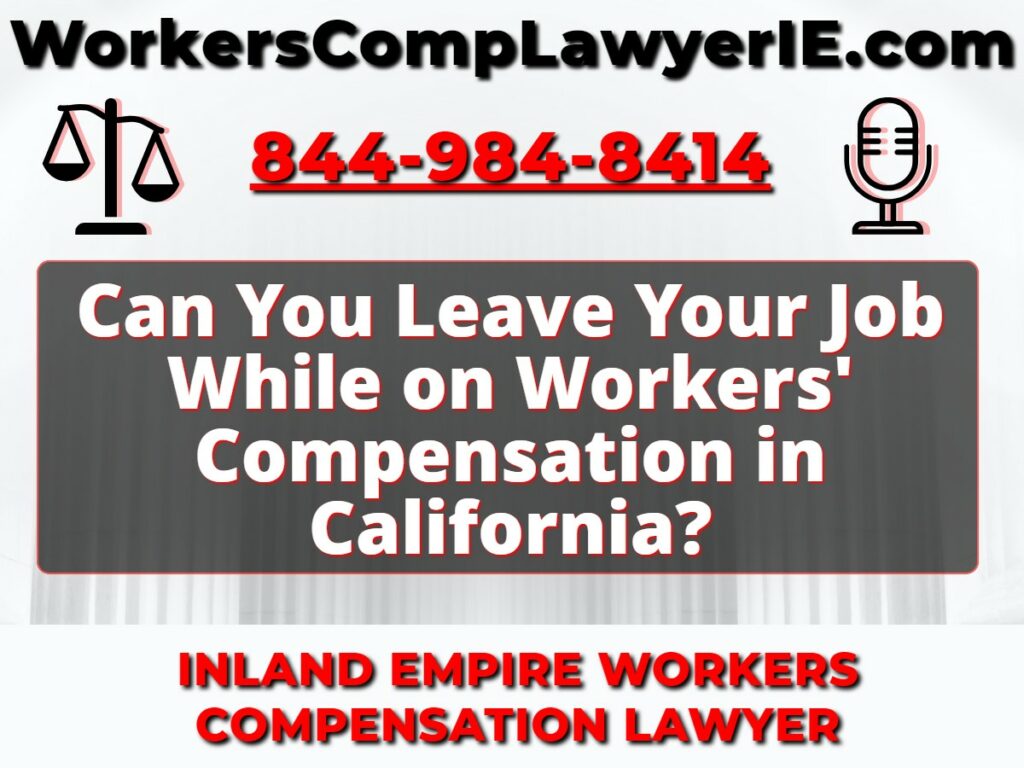Can You Leave Your Job While on Workers’ Compensation in California?

Introduction to Can You Leave Your Job While on Workers’ Compensation in California?
In the bustling state of California, workers’ rights have always been at the forefront of legislative discussions. As industries grow and evolve, so do the challenges faced by employees, especially when it comes to workplace injuries. Workers’ compensation serves as a protective shield, ensuring that those who suffer injuries on the job receive the support they need.
Overview of Workers’ Compensation in California
Workers’ compensation is a state-mandated insurance program that provides benefits to employees who sustain injuries or illnesses as a result of their job. Whether it’s a slip on a wet floor or a more severe incident involving machinery, workers’ compensation is designed to cover medical expenses, lost wages, and rehabilitation costs. In California, employers are required by law to have workers’ compensation insurance, ensuring that workers are protected in the event of unforeseen incidents.
Historical Context of Workers’ Compensation
The roots of workers’ compensation in California can be traced back to the early 20th century. As industries expanded and the workforce grew, the need for a system to address workplace injuries became evident. Prior to the establishment of workers’ compensation laws, injured workers had limited recourse and often faced financial hardships. The introduction of these laws marked a significant shift, placing the well-being of workers at the center of employment practices.
The Significance of Workers’ Compensation Lawyers
Navigating the complexities of workers’ compensation claims can be daunting. This is where the expertise of a workers’ compensation lawyer becomes invaluable. These legal professionals are well-versed in California’s workers’ compensation laws and can guide injured workers through the claim process. From understanding the nuances of the law to representing workers in disputes, a workers’ compensation lawyer plays a pivotal role in ensuring that injured workers receive the benefits they are entitled to.
The Core Issue – Quitting While on Workers’ Compensation
The decision to leave a job is multifaceted and can be influenced by various personal and professional factors. However, when an employee is on workers’ compensation, this decision becomes even more complex due to the legal implications involved.
Legal Implications of Quitting Your Job
In California, workers’ compensation laws are designed to protect employees who suffer injuries on the job. When an injured worker decides to quit their job while receiving benefits, it can raise concerns about the continuity of those benefits. While quitting a job does not automatically terminate one’s right to workers’ compensation benefits, it can potentially affect specific aspects of the claim, such as vocational rehabilitation services.
Factors and Scenarios to Consider
Before making the decision to quit, it’s essential for injured workers to consider several factors:
Nature of the Injury: The severity and type of injury can influence the decision. For instance, if the injury prevents the worker from performing their previous job duties but allows them to take on a different role, quitting might not be the best option.
Medical Treatment: If ongoing medical treatment is required, workers should ensure that quitting won’t jeopardize their access to necessary care.
Employer Retaliation: While California law prohibits employers from retaliating against employees who file workers’ compensation claims, it’s crucial to be aware of the potential risks and ensure one’s rights are protected.
Potential Consequences and Benefits
Quitting a job while on workers’ compensation can have both positive and negative outcomes. On the one hand, leaving a toxic or unsupportive work environment can be beneficial for one’s mental well-being. On the other hand, it might lead to challenges in securing future employment or affect the perception of the worker’s claim. It’s essential to weigh these factors carefully and, if possible, consult with a legal professional to understand the full scope of implications.
Rights, Responsibilities, and Legal Guidance
Every injured worker in California has a set of rights and responsibilities under the state’s workers’ compensation laws. Understanding these can significantly impact the outcome of a claim and ensure that workers receive the benefits they deserve.
Detailed Exploration of the Rights of Injured Workers
In California, injured workers have the right to:
Medical Treatment: Workers are entitled to receive necessary medical care for their injuries, with the costs covered by their employer’s insurance.
Disability Benefits: If an injury results in temporary or permanent disability, workers can receive compensation for lost wages.
Rehabilitation: For injuries that require prolonged recovery or result in permanent disability, workers may be eligible for vocational rehabilitation services.
Representation: Workers have the right to be represented by an attorney throughout the workers’ compensation process.
Responsibilities of Workers
To ensure a smooth compensation process, workers must:
Report Injuries: Injuries should be reported to the employer as soon as possible, typically within 30 days.
Seek Medical Attention: Even if an injury seems minor, it’s essential to get a medical evaluation to determine its extent and required treatment.
Follow Medical Advice: Adhering to prescribed treatments and attending follow-up appointments is crucial for a successful claim.
Cooperate with the Claims Process: This includes providing necessary documentation and attending any required evaluations or hearings.
The Crucial Role of Legal Representation
While the workers’ compensation process in California is designed to be straightforward, the complexities of individual cases can make legal representation invaluable. A seasoned workers’ compensation lawyer can guide injured workers through the intricacies of the law, ensuring that their rights are protected and that they receive the maximum benefits they are entitled to. From gathering evidence to negotiating with insurance companies, a lawyer’s expertise can make a significant difference in the outcome of a claim.
Conclusion to Can You Leave Your Job While on Workers’ Compensation in California?
Understanding workers’ compensation in California is crucial for every employee. Injuries can happen unexpectedly, and being informed about one’s rights and responsibilities can make the recovery process smoother. For those facing challenges with their claims or uncertain about their rights, seeking legal representation is a wise decision. At Inland Empire Workers’ Compensation Lawyer, we have extensive litigation experience in this area. Injured workers in need of legal help can call us at (844) 984-8414 and secure a free consultation. Let our expertise guide you through this challenging time.
